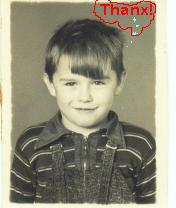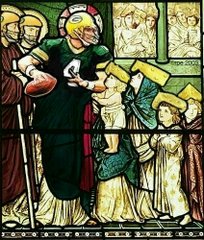TEXT: And behold, a certain lawyer stood up and tested Him, saying, "Teacher, what [must] I do to inherit eternal life?" Luke 10:25
Pr. Doug May of Socorro, New Mexico introduces the Book of Concord reading he has selected for this 7th Sunday after Pentecost with these words:
"To those whom God has called to be His people and established them in His family, He calls on them to keep His statutes, to help the distressed and to love your neighbor. Obedience follows God's love and mercy."
The Book o
 f Concord selection itself is from the Apology, Article V: LOVE AND FULFILLING THE LAW, pp. 167_169, in which our fathers of the faith state:
f Concord selection itself is from the Apology, Article V: LOVE AND FULFILLING THE LAW, pp. 167_169, in which our fathers of the faith state:"The way of justification (legally clear of wrong doing, and so a citizen in good standing) they teach is that people merit grace by good works. This way is the doctrine of reason. For reason, not seeing the uncleanness of the heart, thinks that it pleases God if it performs good works. Therefore, other works and other acts of worship are constantly invented. The Fathers did not intend that we follow the ordinances in order to seek after righteousness, but they were given for the sake of mutual peace among people, so there might be a certain order in the church. Another way of justification is handed down by the scholastic theologians when they teach that we are righteous through a habit infused by God, which is love. They say that, aided by this habit, we keep God's Law outwardly and inwardly, and that this fulfilling of the Law is worthy of grace and of eternal life. This doctrine is plainly the doctrine of the Law. For what the law says is true, "You shall love the Lord your God" (Deuteronomy 6:5). Also, "You shall love your neighbor" (Leviticus 19:18). Love is therefore, the fulfilling of the Law.
"Both of these ways [of justification] exclude Christ. They are, therefore, to be rejected. They do not teach that justification is the forgiveness of sins. Nor that we overcome the terrors of sin and death through faith in Christ. They claim they fulfill the Law and come to God, without Christ as the Atoning Sacrifice."
Simply put, in terms of our Gospel text today, any religion that revolves around th
 e question "What must I do to inherit eternal life?" is on a wild goose chase!
e question "What must I do to inherit eternal life?" is on a wild goose chase!The question itself is a temptation of the devil and the inclination of the hearts of men. It is precisely this quest for what I must do, into which every single one of us is born. It is precisely this quest for what I must do, upon which every other religion than true Christianity, and the false teaching within Christianity, is based. And it is precisely this quest from which we as individuals, congregations, and greater church bodies must be delivered, for it is the path to hell that is paved with good intentions.
Think about the good lawyer’s question very carefully for just a moment. "What must I do to inherit eternal life?"
What does it mean to inherit something? What is the one thing that absolutely must happen before you can inherit anything?
Someone must die, right?
Ultimately this is the point that lies behind the whole conversation between Jesus and the lawyer. And it has been laid before us in Luke’s Gospel that we heard two Sunday’s ago:
Now it came to pass, when the time had come for Him to be received up, that He steadfastly set His face to go to Jerusalem. Luke 9:51
Jesus is on His way to Jerusalem to die in order that we might have an inheritance with Him in the estate of the kingdom of His Father.
Now given that someone has died, in order for that person’s death to be anything meaningful in terms of inheritance, that person must have something of value to pass on to his heirs.
In the verses preceding today’s Gospel, verses that until fairly recent times were included by the Church with the reading for today, Jesus specifically sets the stage for all this talk of inheritance by speaking of the valuable gifts He has for us to inherit by way of His death.
In that hour Jesus rejoiced in the Spirit and said, "I thank You, Father, Lord of heaven and earth, that You have hidden these things from the wise and prudent and revealed them to babes. Even so, Father, for so it seemed good in Your sight. All things have been delivered to Me by My Father, and no one knows who the Son is except the Father, and who the Father is except the Son, and the one to whom the Son wills to reveal Him." (Luke 10:21_22 NKJ)
Finally, for us to actually benefit from and receive the inheritance bequeathed to us, there must be a reading of the will and distribution of its benefits. This reading of the will and distribution of its benefits is what Christ, the Son of the Living God, has sent His called servants of the Word to do as we heard in last week’s Gospel, Jesus sent the 72 to, "heal the sick there, and say to them, 'The kingdom of God has come near to you.' Luke 10:9
By the term sick, Jesus does not mean merely those with physiological maladies, but those who are weak and lacking by way of their sickly, sinful nature. Jesus gets more specific about the delivery of His kingdom, His inheritance later, telling the 12 --
"If you forgive the sins of any, they are forgiven them; if you retain the sins of any, they are retained." John 20:23
"And I will give you the keys of the kingdom of heaven, and whatever you bind on earth will be bound in heaven, and whatever you loose on earth will be loosed in heaven." Matt 16:19
And isn’t this reading of the will and distribution of its benefits what the Divine Service is all about? Throughout our worship service, in virtually every part, you are hearing the reading of the will and having its benefits – the forgiveness of sins, life , and salvation – delivered to you by the executors Christ has appointed. This is most clear and tangible for us in Baptism and the Lord’s Supper.
In Baptism is where the water poured over the heads is accompanied by the words of inheritance: "In the name of the Father and of the Son and of the Holy Spirit."
By these words you are born again, the last piece of the puzzle, "What must I do to inherit eternal life?" You must be born into, made part of, the family to whom the estate has been bequeathed and among whom it is divided and distributed. And, obviously, just as inheriting is not something you do, neither is being born again.
And in the Lord’s Supper you get clear words of inheritance along with a portion of the will itself: "Drink of it, all of you; for this cup is the new TESTAMENT in my blood, which is shed for you for the forgiveness of sins." Matt. 26; Mark 14; Luke 22; 1 Cor. 11.
"What must [YOU] do to inherit eternal life?"
There is nothing you can do! Inheriting is nothing but receiving that which someone else has worked to establish, stored up for you, and left for an administrator to divide and distribute among you and all your brothers.
Having come into this inheritance, now you have the resources you never had before to share with others. Once again, in the words of Pr. May, To those whom God has called to be His people and established them in His family, He calls on them to keep His statutes, to help the distressed and to love your neighbor. Obedience FOLLOWS God's love and mercy.
As one who has the inheritance of heaven, you have all of God’s gifts at your disposal. You can be a neighbor to those who lack what you have to give.
Indeed Christ is THE Good Samaritan who has rescued you from death at
 the hands of those robbers prowling along the road of this earthly life – the devil, the world, and your own sinful flesh. Christ has bound up your wounds with the forgiveness of sins, and has delivered you to the inn-keeping care of the Holy Spirit in His church with her called servants.
the hands of those robbers prowling along the road of this earthly life – the devil, the world, and your own sinful flesh. Christ has bound up your wounds with the forgiveness of sins, and has delivered you to the inn-keeping care of the Holy Spirit in His church with her called servants.And now, in the words of Luther, you are all "little Christs" to whom the Christ Himself says, "Go and do likewise."
Christ has been a neighbor to you, indeed even more than that, He has been your eldest brother to whom the kingdom of heaven has been given. And He has passed that inheritance on to you who are baptized and forgiven all of your sins in the name of the Father, and of + the Son, and of the Holy Spirit. Amen






No comments:
Post a Comment